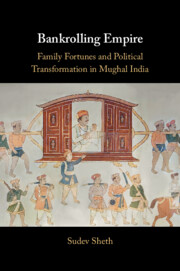‘A remarkable account, path-breaking in its detail, of the shifting relations between private finance and political power in 17th & 18th century India: drawing on original sources, ranging across multiple languages, and moving between microscopic and wide-angled perspectives, Sheth traces the fortunes of a family of Jain bankers, revealing how they calculated and conducted their relations with political power during critical times – surviving the decline of Mughal power, the expansion of British control and the ambitions of local rulers, to emerge as a significant industrial house today. Necessary reading – not just for historians of late Mughal India, but for anyone interested in business history and in historical relations between private capital and state power.’
Sunil Khilnani - Ashoka University
‘How a dynasty of indigenous merchants and bankers in Gujarat made and unmade the fortunes of local rulers. A deeply researched study that lifts the Orientalist curtain which still shrouds the nexus between money and power in premodern Asia.’
Francesca Trivellato - Institute for Advanced Study
‘Sheth employs an intergenerational study of a family of Gujarati financiers to provide original and rich narratives about family business, the relationship between business and politics, and the decline of the Mughal empire. The use of unconventional primary sources, written in eleven Asian and European languages, is extraordinarily impressive.’
Geoffrey Jones - Harvard Business School
‘Following the fortunes of a merchant-banking family in western India across four generations, Bankrolling Empire weaves a rich and exciting narrative of the inter-dependence between merchant capital and state formation in Mughal India. This book is a must read for scholars interested in state-society relations, banking firms and social transformations in early modern South Asia.’
Farhat Hasan - University of Delhi
‘This delightful book uses the prism of family history to address a longstanding debate in the history of the Mughal empire, that of the evolving role of merchants in sustaining, and later dismantling the regime. Based on remarkable multi-lingual research, it is a major contribution to South Asian history.’
Nandini Chatterjee - University of Exeter
‘An important contribution to the study of early modern India. By tracing the activities of several prominent Gujarati banking families across multiple generations, Sudev Sheth resolves a long-standing debate over the Mughal empire’s dependency on indigenous financiers, and whether their withdrawal of lending services had led to imperial collapse.’
Richard M. Eaton - University of Arizona
‘Innovative in its concepts, and creative in its use of a range of historical materials, Bankrolling Empire is a welcome and original attempt to illustrate the transition from the Mughal to the British empire from the hitherto-neglected perspective of the Indian families who financed both. Sheth’s work will be of equal interest to students of the Mughal empire and of the growing field of business history in India.’
Abhishek Kaicker - University of California, Berkeley
‘This book combines deep analysis and wide research in a study of how successive phases of the Mughal, Maratha and early British empires interacted with the entrepreneurial careers of two important Indian capitalist families. It is a pathbreaking contribution to our understanding of global capitalisms in the early modern world.’
Sumit Guha - University of Texas, Austin



